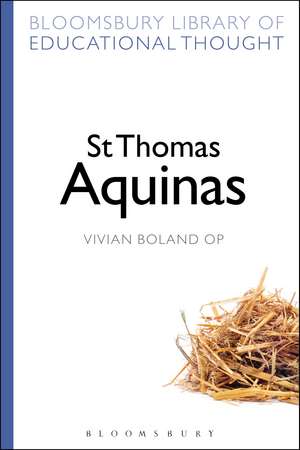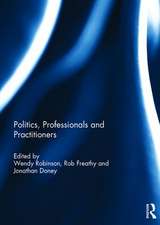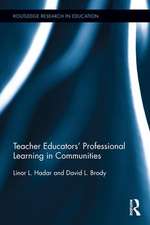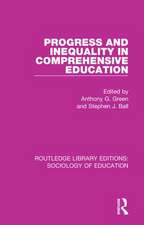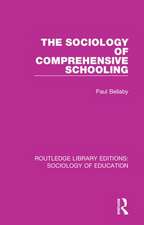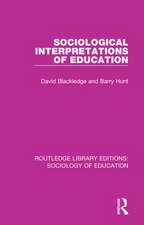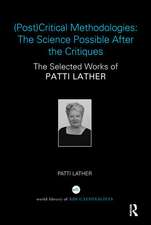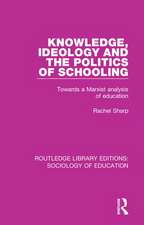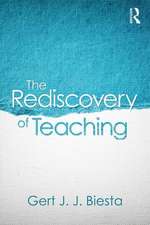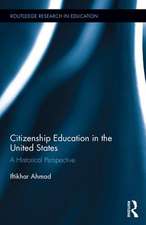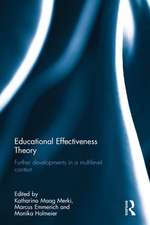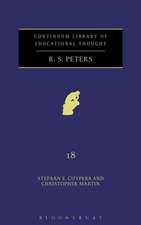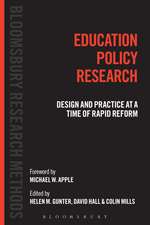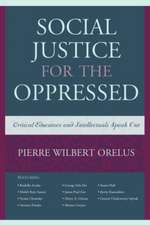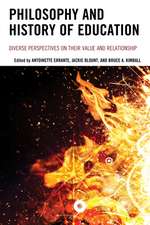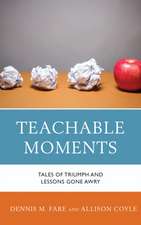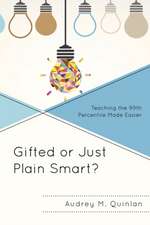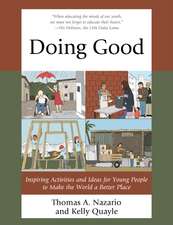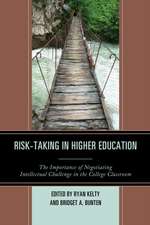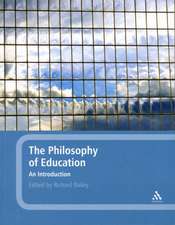St Thomas Aquinas: Bloomsbury Library of Educational Thought
Autor Vivian Boland OP Professor Richard Baileyen Limba Engleză Paperback – 22 oct 2014
Din seria Bloomsbury Library of Educational Thought
- 13%
 Preț: 251.83 lei
Preț: 251.83 lei - 22%
 Preț: 250.45 lei
Preț: 250.45 lei - 13%
 Preț: 250.55 lei
Preț: 250.55 lei - 13%
 Preț: 251.39 lei
Preț: 251.39 lei - 13%
 Preț: 251.57 lei
Preț: 251.57 lei - 13%
 Preț: 250.45 lei
Preț: 250.45 lei - 13%
 Preț: 251.83 lei
Preț: 251.83 lei - 13%
 Preț: 250.45 lei
Preț: 250.45 lei - 13%
 Preț: 256.12 lei
Preț: 256.12 lei - 13%
 Preț: 250.01 lei
Preț: 250.01 lei - 13%
 Preț: 251.39 lei
Preț: 251.39 lei - 13%
 Preț: 253.75 lei
Preț: 253.75 lei - 13%
 Preț: 251.83 lei
Preț: 251.83 lei - 13%
 Preț: 257.50 lei
Preț: 257.50 lei - 13%
 Preț: 256.12 lei
Preț: 256.12 lei - 13%
 Preț: 250.45 lei
Preț: 250.45 lei - 13%
 Preț: 252.42 lei
Preț: 252.42 lei -
 Preț: 300.62 lei
Preț: 300.62 lei -
 Preț: 251.51 lei
Preț: 251.51 lei -
 Preț: 238.53 lei
Preț: 238.53 lei -
 Preț: 272.29 lei
Preț: 272.29 lei -
 Preț: 274.53 lei
Preț: 274.53 lei - 22%
 Preț: 225.49 lei
Preț: 225.49 lei -
 Preț: 273.86 lei
Preț: 273.86 lei
Preț: 257.97 lei
Preț vechi: 295.63 lei
-13% Nou
Puncte Express: 387
Preț estimativ în valută:
49.38€ • 50.88$ • 41.68£
49.38€ • 50.88$ • 41.68£
Carte tipărită la comandă
Livrare economică 04-18 martie
Preluare comenzi: 021 569.72.76
Specificații
ISBN-13: 9781472518903
ISBN-10: 147251890X
Pagini: 256
Ilustrații: black & white illustrations
Dimensiuni: 156 x 234 x 15 mm
Greutate: 0.39 kg
Ediția:New.
Editura: Bloomsbury Publishing
Colecția Bloomsbury Academic
Seria Bloomsbury Library of Educational Thought
Locul publicării:London, United Kingdom
ISBN-10: 147251890X
Pagini: 256
Ilustrații: black & white illustrations
Dimensiuni: 156 x 234 x 15 mm
Greutate: 0.39 kg
Ediția:New.
Editura: Bloomsbury Publishing
Colecția Bloomsbury Academic
Seria Bloomsbury Library of Educational Thought
Locul publicării:London, United Kingdom
Caracteristici
Brings together the work and thinking of Aquinas, the aims of education, the nature of teaching and the structure and content of the curriculum in a form suitable for today's students
Notă biografică
Vivian Boland OP is Vicar of the Master of the Dominican Order, based at Santa Sabina, Italy. He lectured for many years in theology and philosophy, most recently at St Mary's University College, UK, and at Blackfriars, UK. He contributes frequently to theological and pastoral journals.
Cuprins
Series Editor's PrefaceForewordIntroduction Part I: An Intellectual Biography of Thomas Aquinas1. Learning: Monte Cassino, Naples, Paris, and Cologne2. Teaching: Paris, Naples, Orvieto, and Rome3. Reading, Disputing, Repeating4. Sources and Resources5. Openness and Criticism6. Thomas Opts for the Dominicans and for AristotlePart II: Critical Exposition of Aquinas's WorkII (A): Can One Human Being Teach Another?7. Thomas on Teaching: Contexts8. Thomas on Teaching: In II Sentences 9 and 289. Thomas on Teaching: Quaestiones disputatae de veritate 1110. Thomas on Teaching: Summa theologiae I 117II (B): Knowledge, Truth, Faith Reason11. Knowledge12. Truth13. Faith and Reason, Theology and PhilosophyII (C): Pedagogy14. Towards a 'Sound Educational Method': In Boethii de Trinitate 5-615. Kinds of Speculative Sciences16. Method in the Speculative Sciences17. From Sensation and Imagination to Understanding and Wisdom18. The Roots of Aquinas's Pedagogical Concern: Scholastic, Aristotelian, Christian19. From Socrates to Jesus20. The Most Excellent of TeachersPart III: The Reception and Influence of Aquinas's Work21. From Controversial Theologian to Doctor of the Church22. The Second Scholasticism23. The Third Scholasticism24. The Twentieth Century25. Thomists on Education in the Twentieth Century26. Interpreting Aquinas TodayPart IV: The Relevance of Aquinas's Work TodayIV (A): Creation27. The Meaning of Creation28. The Goodness of Creation29. God's Complete FreedomIV (B): The Human Being30. Aquinas Opts for a 'Holistic Anthropology'31. The Unity and Integrity of the Human Being32. Praise of the Body33. The Image of GodIV (C): On Virtue34. Virtue Theory35. Dispositions36. Shaping Character, Strengthening DispositionsIV (D): On Virtues37. Intellectual and Moral Virtues38. Cardinal Virtues: Pieper and Geach39. Contemporary Receptions of Aquinas on Virtue: Hauerwas and MacIntyre40. Criticisms of Virtue Theory41. Virtues for Learning and Teaching42. Human Flourishing: Action, Contemplation, and TeachingBibliographyIndex of Persons and Subjects
Recenzii
A series that recognizes the importance of theorizing for educational thought and to that end seeks to gather together the thoughts and ideas of important educational thinkers.
Aquinas' theory of education is based upon a perceptive account of human person as a rational animal. In this book, Vivian Boland shows the subtlety and breadth of Aquinas' understanding of human intellectual life, looking at the connections between sensation and reason, communal pedagogy and personal virtue, the creative causality of God and the reality of free will. His work makes St. Thomas' thought accessible and illustrates well its perennial relevance.
The publication of this paperback edition of Vivian Boland's St Thomas Aquinas will be welcomed by anyone engaged in the process of teaching and learning for it underscores that this is a venerable tradition. Here Boland reassesses the life and thought of St Thomas Aquinas in an engaging and assessable style. There are four sections to the book: part 1 sets the scene of who is Thomas Aquinas; part 2 is a critically engagement with Aquinas's thought about teaching and learning; part 3 considers the reception and influence of the work; and part 4 considers the argument that Aquinas's approach to teaching and learning is rooted in theological convictions and is philosophically coherent.
It was once fashionable in philosophy courses to jump from the study of Plato and Aristotle to that of the 17th century Empiricists and Rationalists, as though nothing of importance was said in between. So it was with educational theory and ideas. But Vivian Boland's book fills the gap, showing how Aquinas' extensive philosophical writings, covering the main themes of philosophy, led to a distinctive understanding of education which is extremely relevant to today. Those themes in ethics and epistemology illuminated what it means to be human, and the central place of reason, knowledge and virtue in that humanity. Those perceptions are central, it is argued, to the aims of education and thereby to the role of the teacher. Moreover, the book, like Aquinas, does not remain in the realm of pure philosophy, but shows, too, how the educational ideas are manifested in a distinctive scholastic pedagogy from which we can learn. The book is not just about Aquinas as a philosopher, but also about Aquinas as a teacher.
Aquinas' theory of education is based upon a perceptive account of human person as a rational animal. In this book, Vivian Boland shows the subtlety and breadth of Aquinas' understanding of human intellectual life, looking at the connections between sensation and reason, communal pedagogy and personal virtue, the creative causality of God and the reality of free will. His work makes St. Thomas' thought accessible and illustrates well its perennial relevance.
The publication of this paperback edition of Vivian Boland's St Thomas Aquinas will be welcomed by anyone engaged in the process of teaching and learning for it underscores that this is a venerable tradition. Here Boland reassesses the life and thought of St Thomas Aquinas in an engaging and assessable style. There are four sections to the book: part 1 sets the scene of who is Thomas Aquinas; part 2 is a critically engagement with Aquinas's thought about teaching and learning; part 3 considers the reception and influence of the work; and part 4 considers the argument that Aquinas's approach to teaching and learning is rooted in theological convictions and is philosophically coherent.
It was once fashionable in philosophy courses to jump from the study of Plato and Aristotle to that of the 17th century Empiricists and Rationalists, as though nothing of importance was said in between. So it was with educational theory and ideas. But Vivian Boland's book fills the gap, showing how Aquinas' extensive philosophical writings, covering the main themes of philosophy, led to a distinctive understanding of education which is extremely relevant to today. Those themes in ethics and epistemology illuminated what it means to be human, and the central place of reason, knowledge and virtue in that humanity. Those perceptions are central, it is argued, to the aims of education and thereby to the role of the teacher. Moreover, the book, like Aquinas, does not remain in the realm of pure philosophy, but shows, too, how the educational ideas are manifested in a distinctive scholastic pedagogy from which we can learn. The book is not just about Aquinas as a philosopher, but also about Aquinas as a teacher.
